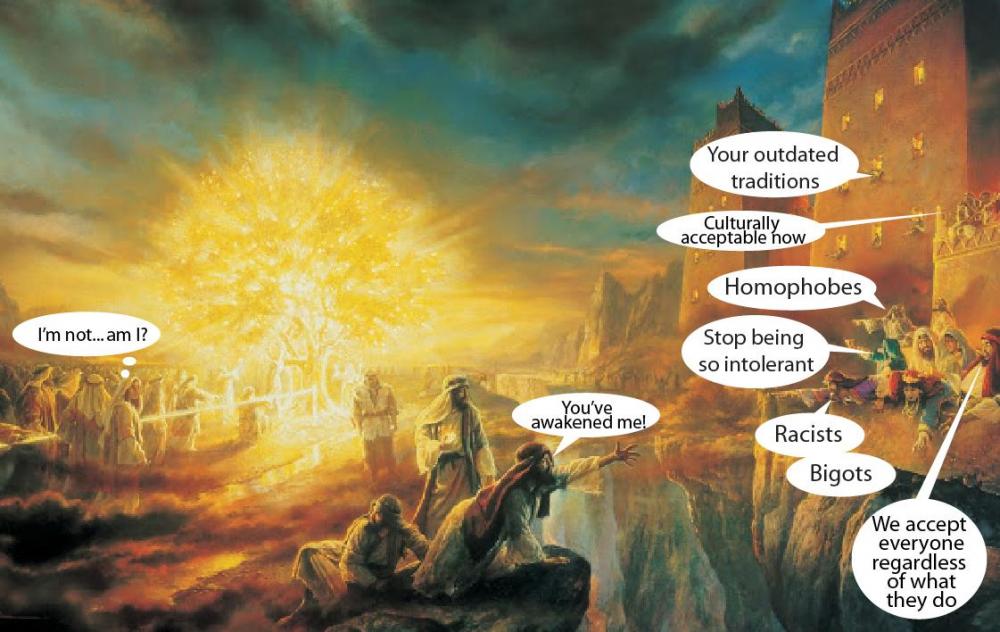Leaderboard
Popular Content
Showing content with the highest reputation on 05/07/21 in all areas
-

Queer sister speaks at 2021 BYU Women's Conference
Vort and 2 others reacted to NeuroTypical for a topic
@Vort, should you ever get the chance to ask one of our church leaders these questions, I hope you decide to do so. Then come back and tell us what they say!3 points -

Queer sister speaks at 2021 BYU Women's Conference
NeedleinA and 2 others reacted to Just_A_Guy for a topic
1. Good. And of course, heterosexual LDS members have the advantage that there has not been a broadly publicized, well-funded movement with support in academia and the mental health professions that has specifically targeted LDS youth and insisted that heterosexual Church members will never find fulfillment and meaning within the confines of the law of chastity. 2. How is a propensity to any sort of behavior a “choice”? I’ll agree that dispositions or predilections can be reinforced by the consequences of prior behavior—but this is also true to some degree in matters of sexual predisposition; which is one reason that the number of youth identifying as LGBTQ has (IIRC) doubled or tripled over the past fifteen years. (And also why we’ve seen numerous reports of transgender teens who, once removed from their school peer groups due to COVID, decided that they were actually cisgender after all.) Anyone who says “I am this way and I have no need to change, and you need to acknowledge that I have no need to change”, is practically by definition seeking validation. 3. “Brainwashed”? There was something wrong with them (and with all of us). They (and we) want to sin. And . . . is the modern trend of them just committing suicide, supposed to be better than whatever we had decades ago? “Better dead than closeted”—is that the mantra now? And, we’re just going to give a pass to the LGBTQ advocates (and the rest of the proponents of the sexual revolution) who for decades said “your life will never be truly fulfilling or meaningful or worthwhile unless you’re getting laid, when you want, with whoever you want”? We’re going to rewrite history and pretend that LGBTQ advocates were just fine, all along, with the Church’s insistence on celibacy for gay members; and that it was the big bad Mormon Church telling chaste LGBTQ members that they had no place among us? 4. The same as the rest of us. Our hearts. Our desires. 2 Nephi 4:31-32. Mosiah 3:19. Mosiah 5:2. Alma 5:12-14. I don’t deny that, especially in matters of sexual orientation, it can be gut-wrenchingly hard (in some cases, impossible in mortality) to completely get there. But if we don’t want that change, we’re not saints. And I think the Church membership generally is entitled to know that any given nominal member at least wants it—Mosiah 18:10, and all that.3 points -

Queer sister speaks at 2021 BYU Women's Conference
NeedleinA and one other reacted to Carborendum for a topic
JJ, I don't know if you intended this, but the take-away from such an experience is that 1) We all have disabilities of some sort. B) It would probably be better if we all just did our best to deal with it as much as possible. Finally) We should be very discriminating when we decide with whom to share our difficulties. Yet the tone of your post seemed to try to argue that we SHOULD be open with whom we share our difficulties. Did I misread you?2 points -
Not every gay person (adults) in the Church is “struggling” with same sex attraction. They are aware of their feelings and they ACCEPT IT and continue LIVING. It is not a constant battle for many and they don’t want to be seen as addicts “recovering” or “struggling”. In my line of work, I see young men and young women struggling to feel they’re not broken, and seeking (desperately in some instances) the tender love of a mother and father. They long for support from parents and family. Sometimes they do have understanding parents who are cognizant of the difference between loving their child and supporting a lifestyle they don’t believe in. Many parents believe that showing any kind of care or concern for their child is automatically a way to support homosexuality. They use these weapons to manipulate their vulnerable son/daughter. When it doesn’t work out, a few of these parents clearly state that their child is now dead. I see adults as well and many in our Church. The experience is a bit different, they are more grounded and they know where they’re standing. Most of them do want to remain in the Church and they are very much aware that they might not be able to find an eternal companion - but just like Liv, they work every day to be better disciples of Christ. They have callings, they help those in need, they go to the Temple, and they are supported by their leaders. They are in good standing with the Lord and yet… time after time a few people within the Church shows them it is NOT good enough and never will be even if the Almighty God says they can enter His house.2 points
-

US reactions?
askandanswer and one other reacted to LDSGator for a topic
Right. As a child we tend to think there are good and bad choices, and there are. You grow up a lot when you realize that in some circumstances, there are bad, and very bad choices, and you are forced to make one of them.2 points -
1 point
-
Yes, yes and yes. Bingo. "Perverted" is absolutely correct, to the point that people don't even know up from down any longer as if they were in a mist of darkness. I don't really care what the 'struggle' is, I just want people, especially "LDS" members who should know better, to: 1. Stop trying to normalize their struggles 2. Stop trying to demand that I, my family, other church members and society in general accept and embrace their struggles or we are some kind of "phobe".1 point
-
What you say above sounds good, NT, but IMO it misses the central point. Sister Liv has urges to fornicate (with members of her own sex). This is how she casually defines herself—sister, YW leader, queer, daughter of God, likes long hikes and camping, etc. Just another morally neutral descriptor. So replace "fornicate (with members of her own sex)" with any other carnal urge toward sin, and tell me how people would respond to its usage as a morally neutral descriptor. Try "fornicate with her neighbor's husband", or "molest young children", or "abuse small animals", or "embezzle funds from her employer", or "curse at loved ones when she's not feeling well". None of them really work. Now, factor in that large swaths of society, including those who call themselves Saints, even on this list, openly advocate for the Church's acceptance of homosexuality. Rather than standing firmly against such agitators and making it clear that we reject all sin in any form, even sin that's currently popular, we instead take a mealy-mouthed approach that doesn't exactly say that homosexuality is okay, but simply avoids the issue of morality and proclaims that homosexuals are people, too! Duh. Can you see that being done with those who are sexually attracted to children? With those who have a terrible temper and a propensity toward physical abuse? With those who are prone to lying and deceiving incessantly? With those who struggle with pimping out their daughters? With those who enjoy kicking puppies and are constantly tempted to do so? The teaching "Homosexually inclined people are children of God and heirs to salvation if they accept Christ" is, I daresay, perfectly fine with and accepted by 98% of Latter-day Saints. Few would argue with it. But it is assumed that the next sentence clarifies, "To accept Christ means to follow his teachings, put off the natural man, and reject carnal actions such as homosexual activity or nurturing homosexual attractions." That latter sentence is missing, and the silence is deafening. Many young Latter-day Saints are being influenced and deceived by the lies of the political Left. At or near the front of this pack of lies is the lie that homosexuality is morally acceptable, a wonderful expression of human love to be nurtured and encouraged in anyone who claims to feel that way, and that anyone who claims otherwise is a "homophobe" and should be shunned from all polite society (and from all economic participation, as far as possible). Our children are hearing these lies, and many of those precious young people are buying into them. We are literally seeing our children being taken from the truth before our eyes. So what is our response? Is it to stand firm as an example to our children, to fight the good fight, to reject evil in all its guises? Or is it rather to talk about love and acceptance and tolerance and all the other buzzwords that sound so good but that the political Left has perverted over the last two full generations as shibboleths of political correctness? Please show me how Sister Liv's open proclamation of her "queerness" and Sister Eubank's subsequent thanks to her make sense in the context of any temptation toward moral perversion, especially sexual perversion, other than homosexuality. If we're talking about a propensity toward sex with little children, are we going to thank people for their bravery in admitting such—especially when their "admission" is really more of a laundry list of personal identifiers? "I'm a son, a brother, a Young Men's president, a man who dreams about sex with little boys, a son of God, and a program manager at work"? How's that going to go over? "Thanks so much for that inspiring introduction, Brother Lyle!" I don't buy it.1 point
-

Queer sister speaks at 2021 BYU Women's Conference
Just_A_Guy reacted to JohnsonJones for a topic
I cannot speak for Suzie, but I have a poor example that may illuminate why this may be. I got to learn about many people over a few years in leadership, and several (more than people may think if the ward I was in is any indication of how many are in other wards) individuals that were disabled to various degrees. Many of them did not let anyone else know and I would not have found out if there had not arisen a situation where they felt I needed to be informed. Most of them felt (and I actually agree that they were correct in many instances) that the members in many instances would discriminate against them. If the members found out someone was disabled, that there would be stereotypes tossed at them either consciously or unconsciously. Some of these would be where, in the instance of physical handicap, that they would not be allowed to help in physical activities and treated as if they were an invalid. I had seen this actually occur. We had one individual that was a worker with scouting who, when the other scouting leaders found out that they had physical difficulties, asked that for that individual to be released. This individual had previously done all that was asked for them to do and was a successful leader. The difference was the membership wanting to "make their burden easier" whether the individual wanted that to happen or not. Dealing with this type of discrimination from some members is difficult. In some ways it feels as if the members do not accept those who have disabilities. I do not feel it is intentional and many times it is only seeking to try to help the individuals, or at least that is how members see it, but even situations like the one above can feel harsh. Other times they literally cannot perform certain callings or do certain things. However, they have many talents in other areas which sometimes are not realized because they have a physical disability. This failure to be accepted fully as others can lead to the individual themselves having trouble accepting themselves and their abilities to do things. This has led many that I found out about their difficulties to hide them from others. Some do not hide their disabilities. They acknowledge them openly. Initially, dealing with others and their life with a disability can be difficult, especially when moving to a new ward. Not all who do this adapt and some have problems coming to the ward...not because they cannot physically do so, but because the difficulty of facing others who do not recognize what the individual actually can do vs. what they have difficulty doing. Others flourish. These openly accept their difficulties and how others may perceive them, but some of them also recognize they have hidden talents and strengths because of these things that others would call disabilities. They accept it is part of themselves. Rather than try to do away or hide it, they show that they still can be complete members with the ability to add great meaning to our lives and the lives of others. The disability they experience in their lives may hinder them in some areas, but it can also be beneficial in others. As I said, this is a poor example (for starters, because having attractions that differ from others, or temptations that are different than what others may experience is not necessarily a disability or a sin, it is merely different things that they deal with or have in their lives), but in some ways there are similarities that I see between how the two different groups deal with who they are, acceptance of themselves, and acceptance from members. It is still not a great example, but perhaps it can help illustrate how admitting one has this as part of their lives and talking to others about it may not necessarily be a bad thing, rather it is just something different in their lives that defines them, but does not control them.1 point -

Queer sister speaks at 2021 BYU Women's Conference
Just_A_Guy reacted to NeuroTypical for a topic
Well, I'm speaking from a position of ignorance here, I'm not even sure which party is producing the line you're citing. But I do know that "B" stands for "Bisexual", meaning, can be attracted to either sex. One would think an acceptable temple sealing could result in such a case...1 point -

Queer sister speaks at 2021 BYU Women's Conference
NeedleinA reacted to Just_A_Guy for a topic
1. I was referring specifically to the parts of your post that I had quoted. I hope many LGBTQ members are enjoying happy, fulfilling lives by seeking to be disciples of Christ and earnestly striving to follow all His commandments, not excluding (and of course, not limited to) the Law of Chastity. 2. The thing is, while I acknowledge that their situations are unique—they are not the only people who struggle with some kind of propensity for sin. What other group of people in the Church who are afflicted with a common weakness, have ever sought validation for the weakness itself and affirmed a hope that the weakness—even if not acted upon—remain a part of their mortal identity? Porn users like myself, don’t. Habitual cussers (also like myself), don’t. Bad spouses and inadequate parents (also like myself), don’t. Drug users, don’t. People who are attracted to children, don’t. Where is the theological or ecclesiastical precedent for this? 3. Yes, but teenagers have walked this road through time immemorial; including in the 1970s and 1980s when Church leaders and institutions were saying and doing some very shocking things. Yet the suicide epidemic came, not in 1975 or 1985; but in the early 2000s as the gay rights movement caught fire. The trauma isn’t in being taught sound doctrine or being held to the behavioral norms that logically flow from that doctrine. The trauma is in the tension between sound doctrine on the one hand, versus distorted definitions of self-worth and self-fulfillment and the meaning of life on the other hand. 4. I didn’t think we needed to debate the question of whether lifelong fulfillment can be found in celibacy, because your last post seemed to acknowledge—indeed, seemed premised upon—the idea that this is something that is indeed happening in the Church on a widespread basis. To the extent that a truly committed, obedient, chaste person finds ostracism in the LDS community upon announcing themselves as LGBTQ and insisting that they have no inclination to have that change—the result, I think, isn’t a factor of cultural homophobia. It’s a factor of the generalized LDS belief that it is both possible and imperative to use the Atonement to at least try to change one’s sinful nature; in conjunction with a sense of bewilderment as to why someone wouldn’t even try to use the Atonement to at least hope for a purification of their nature, while still demanding the privilege of acceptance in a community that is under covenant to do just that.1 point -
JAG, before I make any assumptions... what do you mean exactly by "you hope what I say is true"? I can only speak from my experience. A lot of these members grew up in the Church and they cannot conceive a life without the Gospel. As you know, many are returned missionaries and many are serving missions currently. They accept who they are, they don’t see it as an identify flaw and this is one of the reasons why we hear from missionaries in the field and people like Liv describing themselves as gay. Of course, the journey is unique to each individual particularly when they are young teenagers. Teenagers struggle in understanding why this is happening, it is a very lonely road filled with anxiety and fears because they do not want to lose their parent’s love. JAG, we can argue/debate the psychology behind celibacy and whether or not it is possible or impossible to find fulfillment in a lifelong commitment to it but this isn’t the purpose of my post. My purpose is to show that we find criticism EVEN in the scenario of a gay member living the Gospel and being in good standing with the Lord (holding a Temple recommend). Some members will always seem them as pariahs. We can do better. Note: My apologies, I cannot use the quotation feature for some reason and I have no idea why the font is like this.1 point
-

Celestial Room
JohnsonJones reacted to Emmanuel Goldstein for a topic
Sadly, both of my two oldest daughters have left the church and no longer believe in God. But, they do know that my wife and I love them. My oldest son seems to want to go on a mission and is pretty devoted to his testimony. I am at a loss with my younger son who is 15 and has secretly been going to LGBTQ club. So, I really feel alone with our ward, some of the members are really good people, but they are so busy, they have no time for friendship really. We have a good bishop, but he frankly seems rather burned out with trying to keep the ward afloat. I don't know if it is really worth it anymore and I wonder if I am wasting my time even trying anymore. I guess I am just doomed to a life of struggle and disappointment. I appreciate your comment though, and the time it took for you to write it.1 point -

Queer sister speaks at 2021 BYU Women's Conference
NeedleinA reacted to Just_A_Guy for a topic
Suzie, I hope what you say is true. But the thing is, for the last thirty years the party line has been that what you describe—a LGBTQ individual finding contented fulfillment in a lifelong commitment to celibacy—is emotionally, psychologically, neurologically, evolutionarily impossible. And a lot of us are kinda wondering why it’s so desperately important for us to know that a person is deeply tempted to commit a sin he has sworn never to commit, unless he indeed characterizes the issue as a “struggle” and wants third parties to support him in that struggle.1 point -

The grave has no victory... why do we act like it does?
JohnsonJones reacted to askandanswer for a topic
I think that in all cases, a dead person is reunited with far more family members than they ever leave behind when they die. From one perspective, it could perhaps be said that grief is rather selfish - it focuses on the loss and sadness felt by the griever, rather than being thankful for the improvement in the condition of person that often comes about as a result of their death.1 point -

US reactions?
JohnsonJones reacted to askandanswer for a topic
Well on the one hand, by not allowing Australian citizens in India to return to Australia, the government is protecting Australians in Australia, as the figures are clear that when flights from India were arriving here, the passengers were testing positive at a much higher rate than flights from other countries. On the other hand, by not allowing Australians to return, they are being left unprotected in a country with enormously high infection rates and an extremely limited capacity to care for infected people.1 point -

The grave has no victory... why do we act like it does?
JohnsonJones reacted to Carborendum for a topic
Death has no sting? Yes, it does. But it is temporary. The grave has no victory? Yes, it does. But it is only temporary. Paul's words are talking about eternal consequences, not temporary sorrow. Humans are all about the immediate, not the eternal. That is why we feel sorrow in spite of the end realization of all our promised blessings. That is also why we tend to sacrifice an eternal good for a temporal good.1 point -

The grave has no victory... why do we act like it does?
JohnsonJones reacted to CV75 for a topic
If the grave has no victory, why is it we are sad when people die? I think the reason(s)varies from person to person. Is it a sign that faith truly is not a knowledge of things? Perhaps; it could be a lack of knowledge. Does it show a lack of belief/faith in the gospel? Not necessarily; we awaken our faculties to draw near to God. Are we actually mourning the fact that we are worse off without them? It depends, everyone is different. Are we mourning because we won't see them for a long while? It depends, everyone is different. Was he weeping because he died, or was he weeping because he saw the sorrow of those close to the death? I believe the latter. Are our spirits just naturally inclined to value life since that is the whole purpose of our existence here? Yes, but that does not necessitate sadness with the passing of a loved one: "The afternoon my mother died, we went to the family home from the hospital. We sat quietly in the darkened living room for a while. Dad excused himself and went to his bedroom. He was gone for a few minutes. When he walked back into the living room, there was a smile on his face. He said that he’d been concerned for Mother. During the time he had gathered her things from her hospital room and thanked the staff for being so kind to her, he thought of her going into the spirit world just minutes after her death. He was afraid she would be lonely if there was no one to meet her. "He had gone to his bedroom to ask his Heavenly Father to have someone greet Mildred, his wife and my mother. He said that he had been told in answer to his prayer that his mother had met his sweetheart. I smiled at that too. Grandma Eyring was not very tall. I had a clear picture of her rushing through the crowd, her short legs moving rapidly on her mission to meet my mother." https://www.churchofjesuschrist.org/study/new-era/2003/11/a-matter-of-the-heart?lang=eng So despite there being a deeply rooted belief of an afterlife, our souls cannot help but feel sorrow when there is a loss of life? Not necessarily. Is it possible to experience the death of a close one and feel no sorrow because one's faith in an afterlife is so strong that they know they will see them again? Yes, it is possible. If yes, should we be concerned about the strength of our faith if someone dies and we are sad? I think we should always look for opportunities to increase our faith, and observing (both in the sense of acknowledging and processing instead of denying or repressing) our emotions, in concert with the companionship of the Holy Ghost, is one way to to that.1 point -

Queer sister speaks at 2021 BYU Women's Conference
Carborendum reacted to Vort for a topic
That is literally the topic of the thread.1 point -

Inactive member in polygamous relationship
Vort reacted to applepansy for a topic
No, Vort wants you use actual quotes and not "most likely" ones. I would like you to do listen to what you're being told without being defensive. Did you really believe that active members of the church were going to pat you on the back and say "good for you"??? I have never in my years here at lds.net read through a thread that has left me shaking my head so much. Fate, you're not here to hear truth. You're here to get justification for what you want to happen. Sorry...you're not going to get anyone here who understands the gospel, the churches stance on polygamy, or adultery to agree with any of your justifications for living an adulterous life. at this point in your wife would most likely be excommunicated also. I'm actually appalled that your wife thought she could give another "woman" as a gift.1 point -
Also because of his high intelligence, his temple allowed him to go on a mission earlier than 19.0 points




